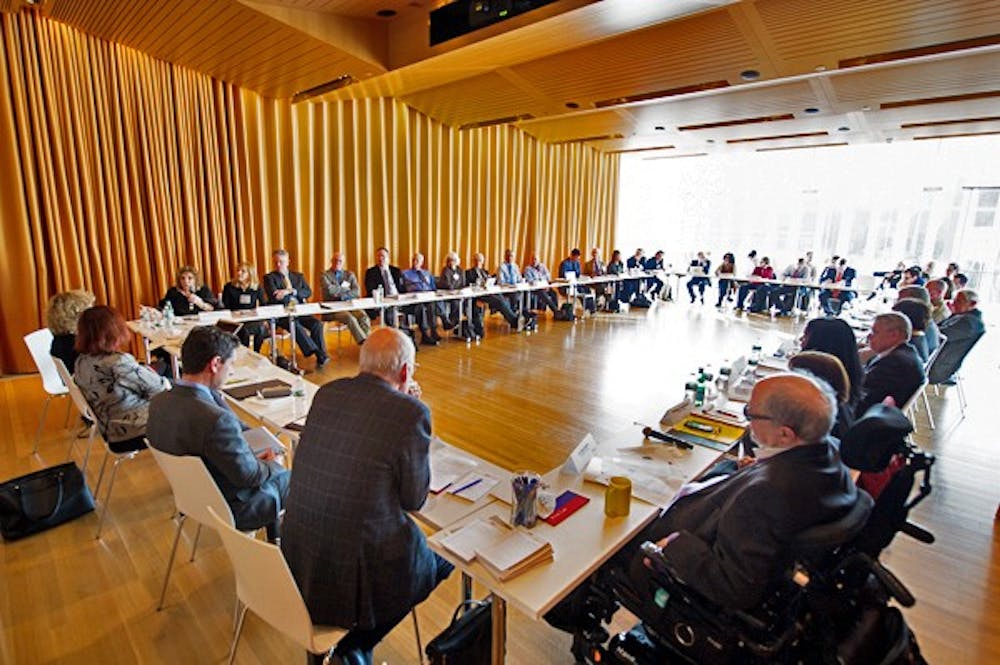
An interdisciplinary group of experts engage in discussion at CERL’s conference on combat trauma, PTSD, and “moral injury.” | Courtesy of Sameer A. Khan
The national conversation on mental health permeated a conference at Penn Law School last weekend.
As part of the Penn Center for Ethics and the Rule of Law’s conference on “Preventing and Treating the Invisible Wounds of War,” speakers focused on the challenges of understanding, curing and compensating combat-related psychological injuries in veterans.
Despite significant disagreements between participants — several disagreed over whether post-traumatic stress disorder should even be called a “disorder” — almost everyone at the conference agreed that there was no single solution that would fix this multi-faceted problem.
“When you start to close in on common ground, and the people talking to one another come from such different backgrounds and have such different experiences, then you know you’re really on to something,” Finkelstein said.
Founded by Penn Law professor Claire Finkelstein, CERL grew out of her expertise in the relationships between law, politics and ethics. Finkelstein, who holds both a law degree and a doctorate in philosophy, often connected these fields to each other during her graduate education. She wanted to bring a similar interdisciplinary approach to answering practical questions associated with warfare.
“I thought, wouldn’t it be fascinating if we got people from all these different disciplines together to discuss this and try to bridge the gap between theoretical work in academia and practice,” Finkelstein said.
Finkelstein established CERL in 2012 with support from Penn Law and seed money from Pamela Craven, who graduated from Penn and now sits on Penn Law’s Board of Overseers, and her husband William. William Craven, who worked for many years in the defense industry, also chaired CERL’s executive board but stepped down earlier this semester.
“We are proud to have been able to provide initial funding to set CERL on a path which we hope will contribute to intelligent and principled reflection on national security and the rule of law,” Craven wrote in CERL’s 2012-14 biennial report.
CERL’s success began with its first conference, which focused on targeted killing. Finkelstein noticed that over the course of the two-day program, participants from different fields, such as ethicists, arms control activists and lawyers, gradually came to understand the nuances of each other’s arguments.
“Little by little, we started to coalesce and started to be able to speak each other’s languages,” Finkelstein said.
Since then, Finkelstein has worked to bring together both scholars and practitioners from numerous disciplines in order to analyze some of the most controversial military challenges facing United States policy, including enhanced interrogation, risk management and autonomous weapons systems. Last weekend’s conference on combat-related psychological injuries featured 46 experts, including psychiatrists, lawyers, trauma therapists and commissioned U.S. military officers.
In the past three years, Finkelstein has watched CERL grow significantly, with last weekend’s conference just one of the center’s many programs. In addition to its regular speakers and discussions, CERL has published two interdisciplinary volumes on the topics it has studied and hopes to compile a third on PTSD using material from last weekend’s conference.
The center is also working on numerous partnerships with other organizations, which Finkelstein hopes will increase the breadth of CERL’s research in ethics and the rule of law. Her team is currently working with Penn’s Middle East Center next fall on a conference that will include discussion on the Iran nuclear deal. They will also be working with the Wharton Leadership Center and the Zicklin Center for Business Ethics Research to host a conference on ethical leadership.
“We started out focused more narrowly on military subjects such as targeted killing and enhanced interrogation techniques. Now we’re reaching out a little more broadly,” Finkelstein said.
As CERL’s activities increase, Finkelstein hopes that the center’s work will reach more students across all of Penn’s schools. CERL currently offers a full-time, paid summer internship that gives students the opportunity to meet with experts on subjects that CERL is exploring. This past summer, Finkelstein reported, the internship pool was larger and more diverse than it had ever been, including students from public policy schools, philosophy majors and practitioners recently out of school as well as law students.
More recently, Finkelstein has begun teaching a year-long course funded by the Provost Interdisciplinary Seminar Fund that combines elements of both a traditional law course and an internship.
The course is open to both law students and undergraduates.
Finkelstein hopes that her work with CERL will add a new element to public discussions on security policy. She believes that ethics and the rule of law are powerful considerations that all government officials need to address when making military decisions, regardless of their ideological or political beliefs.
“It is foundational to American society that we value most deeply the fact that we are a nation of laws, not men,” she said. “The concept of the rule of law is a nonpartisan value.”
The Daily Pennsylvanian is an independent, student-run newspaper. Please consider making a donation to support the coverage that shapes the University. Your generosity ensures a future of strong journalism at Penn.
DonatePlease note All comments are eligible for publication in The Daily Pennsylvanian.








